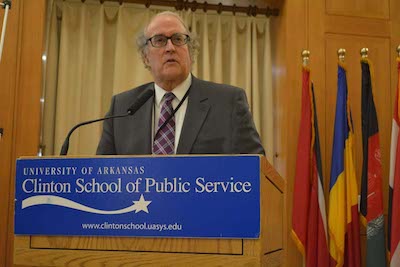On December 12, 2016, Alex Beehler, Visiting Scholar and Board Member of the Environmental and Energy Management Institute (EEMI), participated in two panels as part of a university roundtable on "The Role of Higher Education in Accelerating Clean Tech Innovation & Deployment" at the University of Arkansas Clinton School of Public Service at Little Rock, Arkansas. The roundtable was part of the Global Solutions Summit/P 80 Group gathering, organized by the Club de Madrid.
The Club de Madrid is an independent non-profit organization created to promote democracy and change in the international community. Composed of 95 regular members, 64 of which are former presidents and 39 of which are former prime ministers (some are both) from 65 countries, the Club de Madrid is the world’s largest forum of former Heads of State and Government. The related P80 Group Foundation works with a collection of public pension and sovereign wealth funds and was founded by Britain’s Prince Charles., the Prince of Wales. The first Global Solutions Summit to address many of the ideas of the Little Rock Accord was held in 2014 in Washington, D.C.
The roundtable "Sustainability, Innovation, and Technology Deployment in Higher Education", brought together academic leaders from five universities (Universities of Arkansas, Florida, Indiana, Virginia Tech and GW) to explore how universities are stimulating innovation in the field of clean technology research, applications, and deployment globally. Presenters also discussed best practices for leveraging resources of higher education to pioneer new solutions for global sustainability.
Prof. Beehler also participated in a second panel, " Bridging the Gap: Public-Private Initiatives in Technology Demonstration and Verification and its Role in Cleantech Commercialization and Deployment,", which focused on in-the-field demonstration programs and how they support commercialization and bridge the gap between technology development initiatives and sustainability evaluations occurring at universities and startup companies and the real world. Alex drew upon insights gleaned while at the Defense of Department overseeing such programs.
Gov. Asa Hutchinson opened the conference’s panels and presentations Monday with a speech about technology’s role in solving global problems and touted his computer-science initiative in state schools. Technology can enhance security, Hutchinson said, referring to his time working for the U.S. Department of Homeland Security, and it can address shortages in food, water and energy.
Former Fulbright scholars also spoke Monday about their experiences and mobilizing the more than 300,000 Fulbright alumni to promote using technology to address growth and sustainability across the world. Among the alumni was former Bosnia-Herzegovina Prime Minister Zlatko Lagumdzija, who studied computer science in the U.S. more than two decades ago.
One immediate result of the roundtable and subsequent discussions at the Summit is the formation of the Higher Education Cleantech Consortium (HECC) to enhance Cleantech and Sustainability efforts at home and abroad. Prof. Beehler will be participating in the HECC Steering Committee.


